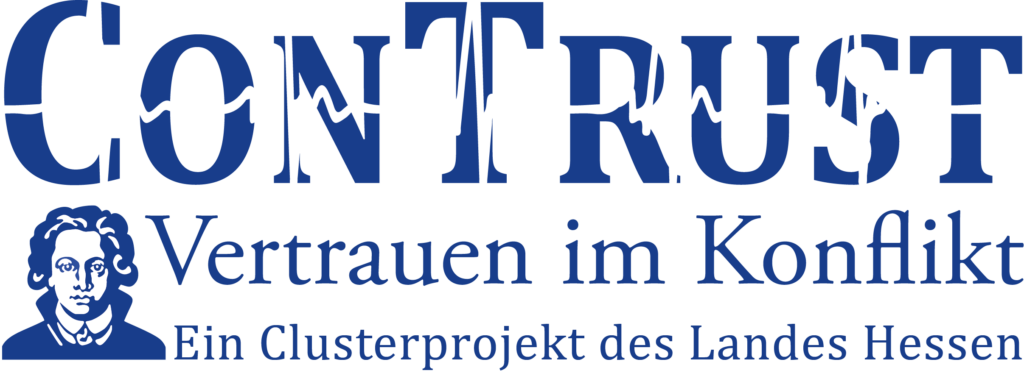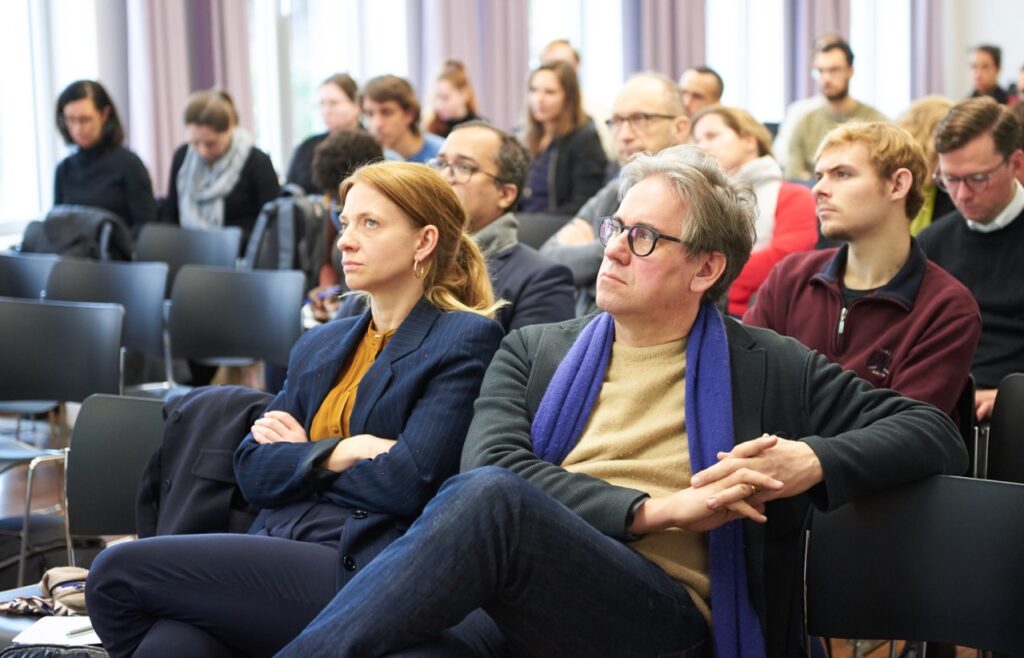Cluster project
ConTrust – Trust in conflict
As a joint research initiative of Goethe University and the Hessian Foundation for Peace and Conflict Research Frankfurt, ConTrust stands in contrast to prevailing trends in relevant research. Firstly, it does not see trust as an opposite concept to that of conflict, but assumes that trust only emerges, forms and proves itself in conflict: Trust in and through conflict. Secondly, the research initiative seeks to methodologically transcend conventional disciplinary boundaries in the study of trust and conflict as well as the gap between empirical and normative analyses. Thirdly, the initiative’s research places the “question of trust” in a framework that explores new qualities of uncertainty (and insecurity) that did not only become apparent during the coronavirus pandemic (but especially there). This also includes reflecting on the changing media in which trust and mistrust are communicated and constituted and conflicts are represented. Fourthly, it is made clear that, unlike in most alternative approaches, the concept of trust is not to be seen as entirely positive, but that there can also be authoritarian forms of trust that deny freedom and are politically destructive. Finally, the project aims to draw practical conclusions with regard to the possibilities of shaping conflicts in such a way that trust can be formed and stabilized in a productive manner. In this sense, dialog with society is an integral part of our research.

Conflicts are unavoidable in social contexts, and yet they do not make living together impossible. But where do we get the certainty that conflicts will not escalate, that our counterparts will abide by the rules, that institutions will protect us against transgressions and that the social world as a whole is stable enough for us to orient our actions within it in a meaningful way? The answer is trust. Trust creates an “unsecured certainty” that can never be fully redeemed and yet constitutes the secret of social coexistence. But how is trust formed, what are its origins?
These assumptions and intentions structure the joint, interdisciplinary, empirical and normative research into the dynamics of trust in key conflict contexts, ranging from democratic structures, international politics and markets to knowledge discourses and the media.
The researchers want to develop a diagnosis of the dynamics of trust and mistrust in typical conflict constellations and use it to establish an international center for trust and conflict research. Central measures to achieve this are the targeted recruitment and promotion of outstanding junior and mid-career level researchers in order to supplement and strengthen existing expertise. In addition, the appointment of several professorships at the Frankfurt site is planned to build the structure and profile of research in Frankfurt.

The speakers of ConTrust are:
Arbeitsgruppen
Arbeitsgruppe 1: Demokratie
Die Arbeitsgruppe beschäftigt sich mit der Frage, wie Demokratien Konflikte produktiv bearbeiten. Sie untersucht, wie demokratische Prozesse und Strukturen positive Wechselwirkungen von Vertrauen und Misstrauen in Konflikten ermöglichen. Ziel der gemeinsamen Forschung der Arbeitsgruppe ist es, Bestandteile einer spezifisch demokratischen Konzeption von Vertrauen im Konflikt zu identifizieren und negative oder pathologische Formen politischen Vertrauens davon zu unterscheiden.
DemokratieArbeitsgruppe 2: Zwang und Sanktion
In allen politischen Herrschaftsordnungen wird Zwang zur Bearbeitung von Konflikten angewendet. Vor diesem Hintergrund stellt sich die Arbeitsgruppe die Leitfrage, wie Zwang zur Produktion von Vertrauen oder Misstrauen in und durch Konflikte beiträgt. Untersucht wird, wie ausgewählte Formen von Zwang (rechtlich, militärisch etc.) auf positive wie negative Konflikterfahrungen zurückgehen, den Verlauf von Konflikten beeinflussen und so im Laufe der Zeit Vertrauen in und durch Konflikte hervorbringen.
Zwang und SanktionArbeitsgruppe 3: Markt
Die Arbeitsgruppe analysiert das komplexe Verhältnis zwischen Vertrauen und ökonomischen Konfliktformen. Während Märkte allgemein als Garant für wirtschaftliches Vertrauen angesehen werden, werden die meisten Entscheidungen nicht im institutionellen Vakuum getroffen, sondern im Rahmen formeller und informeller Institutionen. Im Zentrum des empirischen Arbeitsprogramms der Gruppe stehen zwei Projekte, eines zur Frage, wie die COVID-19-Pandemie das Verhältnis zwischen Staat und Wirtschaft neu ordnet, und eines zur Frage, wie Krisen die geschlechtsspezifische Arbeitsteilung im Haushalt verändern.
MarktArbeitsgruppe 4: Wissen
Die Arbeitsgruppe untersucht die Rolle von Wissen und wissensbasierten Institutionen (epistemischen Autoritäten) für die Entstehung von Vertrauen und Misstrauen in sozialen Konflikten. Wissen über die Präferenzen der anderen, aber auch über die soziale und natürliche Welt, ist eine wesentliche Ressource, um Konflikte produktiv zu bewältigen. Wo Wissen geteilt wird, entsteht und stabilisiert sich Vertrauen. Diese Stabilisierungsleistung hängt jedoch selbst von epistemischem Vertrauen ab, dessen genaue Form und Rolle durch die Forschung der Arbeitsgruppe erst noch zu bestimmen ist.
WissenArbeitsgruppe 5: Medien
Die Arbeitsgruppe untersucht, wie Medien in pluralistischen Gesellschaften Vertrauen schaffen und dadurch die produktive Austragung von Konflikten ermöglichen sowie diese Prozesse zugleich reflektieren. Ausgehend vom Befund der zunehmenden Digitalisierung von Kommunikation, untersucht die Arbeitsgruppe die operationalen und formalen Aspekte von Massenmedien (Presse, TV), Film, Literatur, Telekommunikation und sozialen Medien sowie von Funktionsmedien in Recht, Wirtschaft und Politik in ihrer formellen und informellen Verwendung. Der methodische Ansatz der Arbeitsgruppe geht über inhalts-, text- und technikzentrierte Analysen hinaus und berücksichtigt ästhetische, juristische und ökonomische Faktoren.
Medien
